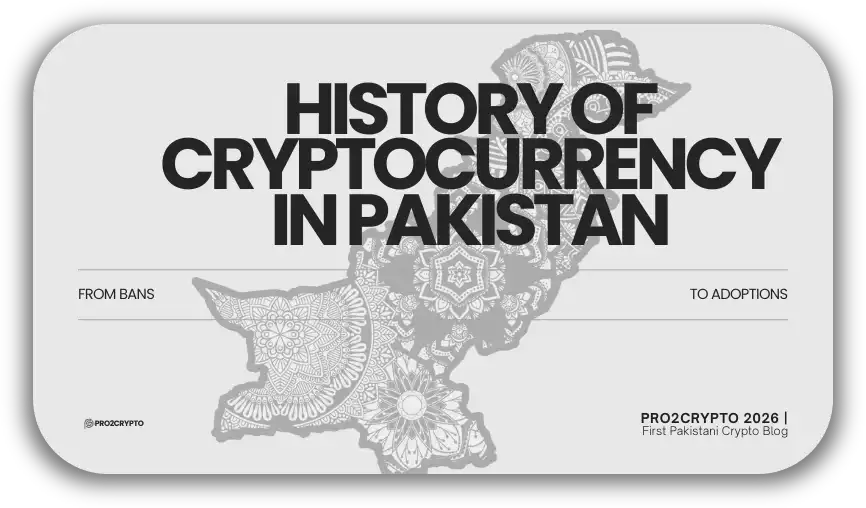Cryptocurrency in Pakistan has evolved from being completely banned and unregulated to becoming one of the top 10 countries in global crypto adoption. Early regulatory crackdowns by the State Bank of Pakistan and warnings from SECP created uncertainty, but growing interest among freelancers, overseas Pakistanis, and digital natives led to widespread P2P adoption. The establishment of the Pakistan Crypto Council (PCC) in 2025 has introduced regulatory clarity, investor protection, and promotion of blockchain innovation, shaping Pakistan’s future as a competitive crypto ecosystem.
Cryptocurrency in Pakistan has followed a tumultuous journey — from outright bans by regulators to becoming one of the top 10 countries in global adoption rankings. This history is vital to understanding why the Pakistan Crypto Council (PCC) was created and how it shapes the future of digital assets in the country.
What Gen Z is upto in Pakistan regarding Cryptocurrency? Read Here
The Early Years – Bitcoin Enters Pakistan (2010–2015)
- Bitcoin first appeared in Pakistan around 2010–2011, mostly through online forums and early adopters.
- At this stage, crypto was seen as a niche technology used by a small group of tech enthusiasts and freelancers.
- No official regulations existed, and usage remained underground.
Crackdowns and Bans – The Regulatory Backlash (2016–2018)
- As crypto trading volumes grew, concerns over money laundering and fraud led regulators to take action.
- In 2018, the State Bank of Pakistan (SBP) issued a circular banning banks and financial institutions from dealing in cryptocurrencies.
- SECP (Securities & Exchange Commission of Pakistan) also issued public warnings against investing in unlicensed crypto platforms.
- Despite this, P2P trading on platforms like LocalBitcoins and Binance continued to rise.
Court Cases and Legal Ambiguity (2019–2020)
- Crypto users and exchanges filed petitions in Pakistani courts, seeking clarity on whether owning or trading crypto was illegal.
- The courts did not criminalize personal ownership but left the regulatory status in limbo.
- During this period, scams and Ponzi schemes increased, leading to widespread fear but also highlighting the need for regulation.
The Rise of Adoption – Pakistan Among Top 10 Global Users (2020–2022)
- With high inflation and currency depreciation, many Pakistanis turned to Bitcoin and stablecoins as a hedge.
- Reports from Chainalysis ranked Pakistan among the top 10 countries in crypto adoption.
- Freelancers, e-commerce sellers, and overseas Pakistanis increasingly adopted USDT (Tether), Bitcoin, and Ethereum for payments and remittances.
Discover the impact of crypto on Pakistani Freelance community here. . .
Government Engagement – Toward Regulation (2022–2024)
- Growing adoption and international FATF compliance pressure pushed the government to consider formal regulation.
- SECP began studying frameworks for regulating crypto exchanges and investor protection.
- The debate around Islamic finance and Shariah compliance also grew louder, with scholars divided on whether crypto trading was halal or haram.
- Pilot blockchain projects in supply chain and land registries showed government interest in blockchain beyond just crypto.
Establishment of the Pakistan Crypto Council (2025)
- In March 2025, the Pakistan Crypto Council (PCC) was launched under the Ministry of Finance.
- PCC’s role is to:
- Draft clear regulations for cryptocurrencies and virtual assets.
- Protect investors from scams.
- Promote blockchain innovation across industries.
- Ensure compliance with FATF standards.
Crypto Regulatory Timeline in Pakistan
| Period | Events & Developments | Impact |
|---|---|---|
| 2010–2015 | Bitcoin enters Pakistan; early adopters; no official regulations | Crypto usage underground; niche community adoption |
| 2016–2018 | SBP ban on banks; SECP warnings; P2P trading increases | Regulatory crackdown; uncertainty but continued P2P growth |
| 2019–2020 | Court petitions; scams increase; legal ambiguity | Highlight need for regulation; fear and caution among users |
| 2020–2022 | Pakistan among top 10 countries in adoption; freelancers & overseas workers adopt crypto | Mainstream adoption grows; crypto becomes a hedge against inflation |
| 2022–2024 | Government studies regulation; Shariah debate; blockchain pilots | Policy frameworks in discussion; regulatory awareness rises |
| 2025 | PCC established under Ministry of Finance; clear regulations drafted | Investor protection; promotion of blockchain innovation; FATF compliance |
From Ban to Future Opportunity
The history of crypto in Pakistan illustrates a shift:
- From regulatory hostility to pragmatic regulation.
- From underground trading to mainstream adoption.
- From confusion to the beginnings of policy clarity.
Today, Pakistan’s challenge is to balance innovation, compliance, and consumer protection — a challenge that the Pakistan Crypto Council is designed to address.
Summary
- 2010–2015: Bitcoin enters Pakistan; early adopters included tech enthusiasts and freelancers; no formal regulation existed.
- 2016–2018: SBP bans banks from crypto transactions; SECP issues warnings; P2P trading continues underground.
- 2019–2020: Court cases create legal ambiguity; scams increase highlighting the need for regulation.
- 2020–2022: Pakistan ranks among top 10 countries in crypto adoption; freelancers and overseas Pakistanis increasingly use crypto for payments and remittances.
- 2022–2024: Government studies regulatory frameworks; debate over Shariah compliance; pilot blockchain projects emerge.
- 2025: PCC established under Ministry of Finance to regulate crypto, protect investors, and promote blockchain innovation.
- Overall: Shift from underground trading to mainstream adoption and regulatory clarity, balancing innovation, compliance, and consumer protection.
Conclusion
Pakistan’s crypto journey is a story of resilience and transformation. Despite early bans and uncertainty, millions of Pakistanis embraced cryptocurrencies for investment, remittances, and business. Now, with the PCC in place, Pakistan has the chance to transform its crypto future from informal adoption to a regulated, globally competitive ecosystem.
Join our Whatsapp Here


3 thoughts on “History of Cryptocurrency in Pakistan – From Bans to Adoption”